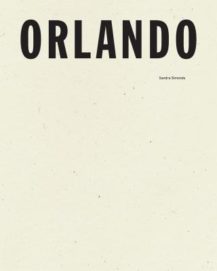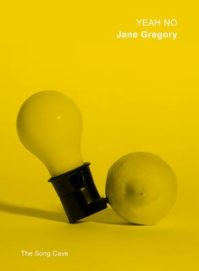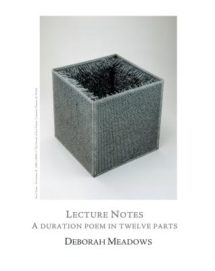Orlando
Sandra Simonds
Wave Books ($18)
Yeah No
Jane Gregory
The Song Cave ($17.95)
Lecture Notes: A Duration Poem in Twelve Parts
Deborah Meadows
BlazeVOX ($18)
by Greg Bem
What is being written in books in 2018? What is being written in books of poetry in 2018? What are feminist voices saying in these books? I ask these questions again, again, and again. Reading, literally and figuratively, is a system of world-building, undertaken both by a book’s author and its reader. For the author—the instigator of this project—the forces that influence this world-building can come from her interior life or the external life spent negotiating society, if not some combination of the two. This triangulation, the intersections, the crossing over spaces of thought between realms of existence—these all offer insight into lives that are not our own.
 In Sandra Simonds’s Orlando, Jane Gregory’s Yeah No, and Deborah Meadows’s Lecture Notes: A Duration Poem in Twelve Parts, three unique women write unique works using powerful systems of style, tone, and image. These authors maintain individualities wrapping around their books and their identities. And yet, despite their distinct methods of self-expression and how each book stands on its own, there are astute similarities in how these poets approach fragments of worlds larger than themselves. As they grow in complexity and dimension, their worlds inform and complement one another, all three connected by common values of clarity, intellectual inquiry, and responsibility. There is a sense of the marvelous here, too: The worlds within these publications continue a journey for American poetry, and American feminism, that welcomes, challenges, and evolves our collective aesthetic.
In Sandra Simonds’s Orlando, Jane Gregory’s Yeah No, and Deborah Meadows’s Lecture Notes: A Duration Poem in Twelve Parts, three unique women write unique works using powerful systems of style, tone, and image. These authors maintain individualities wrapping around their books and their identities. And yet, despite their distinct methods of self-expression and how each book stands on its own, there are astute similarities in how these poets approach fragments of worlds larger than themselves. As they grow in complexity and dimension, their worlds inform and complement one another, all three connected by common values of clarity, intellectual inquiry, and responsibility. There is a sense of the marvelous here, too: The worlds within these publications continue a journey for American poetry, and American feminism, that welcomes, challenges, and evolves our collective aesthetic.
In Sandra Simonds’s collection Orlando, the transformation of “Orlando the city” into “Orlando the friend” is a tidal turn. Simonds confides in Orlando, shares her history of victimization and receiving of abuse with Orlando, explores power through Orlando. Orlando thus becomes more than its 80 pages of poems. It is the transition of the city. It is the intimacy of personification. It is the beauty of maturity. It is the countenance before and beyond revolution in being:
the Small World: how they weave their way inside a collective eureka,
they shriek a giddy shriek
into the phantasmagoria of this trashy arrangement, a spell on each
reverberating culture,
lit by electronic candles, the moon happy as a soldier, every piece
dances to the gnawing
Orlando represents an incredible feat of poetic prowess by its breadth and by its representations of place, person, and truth. The book explores the most human moments of the systems within which we live—systems that layer, stack, take on new meanings. We are reminded of tragedy, violence, and sadness. Systems bring us interlocking moments of emotion, thought, and reaction. A microcosmic muse in a bubble of tropical noise, Orlando becomes a sequence that shatters with the breathing of a poet who has been broken but survives, a poet who accepts mutation of and transgression toward self.
Simonds’s book is structured into two pieces, the title poem and “Demon Spring.” Written in tercets, “Orlando” tracks the speaker’s experiences with stalking and abuse, which result in a solitude that offers chances for reflection and serenity. The work is written in a sprawling verse that reads more like prose than poetry—the words are hungry to move from line to line, expressionistic and hedonistic all the same. The brutality, the seizing of ideas upon ideas through the author’s narrative turns Orlando into a gauntlet for writer and reader both, as in this passage from “Demon Spring”:
Locked in the beauty of the pearl,
far from frail, a mellow rain flows
over Orlando
Orlando, place of raw material, place of affect,
place of this lush box, the pulse so lush
it makes the live version of history
stream before you like tears
While the structure of “Orlando” breaks toward the experimental (or, rather, chaotic) in form and tone by breaking down the tercet sprawl into jagged, staccato lines, the second half of Simonds’s work is equally enticing and rupturing. It falls into place through its most gratuitous descriptions of a life built upon systems. This is a necessary repetition, a validation, a heartbreaking and entrancing position of a storyteller whose life subsides in cycles of cruelty. The book resonates with both approachable horror and the unapproachable banality of peace. An exploration but also evocation of the very environment which continues its brutality, Orlando is a book that is relentless, bold, and thorough, and yet fulfills the chaos of life, the vision of destructive and regenerative energies. Like the city which is carries its name, the book succeeds, continues, and grows.
 Growth is a form of illumination, by what it brings into being and what it coincides with. While Simonds manages to explore space and time through the confines of a large, empowered symbol, Jane Gregory, in her latest book Yeah No, begins from within. Growth in Yeah No is challengingly personal and cryptically impersonal. What at first glance appears to be rush upon rush of the delusional is also consciously formed with patterns and systems in mind.
Growth is a form of illumination, by what it brings into being and what it coincides with. While Simonds manages to explore space and time through the confines of a large, empowered symbol, Jane Gregory, in her latest book Yeah No, begins from within. Growth in Yeah No is challengingly personal and cryptically impersonal. What at first glance appears to be rush upon rush of the delusional is also consciously formed with patterns and systems in mind.
Yeah No is a book of fierce curiosity. A puzzle box of intertwined experiences that range the gamut of emotional context, this collection bears an identity of lenses, the spectral and layered models. Gregory’s persistence of language is striking. There is a dualism in form through the programmatic and the faded: language of certainty is emboldened and language of passivity lingers just beyond. On the page this appears through the poet’s use of literally lighter text, and yet the idea, in multiple iterations, extends to other spaces and forms. The language itself is thoroughly, if not universally, capable of keeping itself in check:
This is a book of paranoia obviated by paranoia It exists a delusion
scrapped by reality It is called RUIN HATH / THEY HAVE ME
Gregory’s work explores critique, doubt, and the means of explanation. To most poets, the act of expression is one that, in being made, represents truth. But what is truth through the myriad of emotions and other factors that make up autonomy in our own, singular sentience? And at what cost are we to take on and responsibly deal with these qualities? A system of investigation and understanding, of awareness and empathy, by and for the self, is raised up and up. The cost is investment in a mindful approach to a poetics of precise introspection. Yeah No is about the acknowledgment and respect of contradiction through the process of care.
For the reader, this form of exploration turns out to be quite dark. Despite the illumination and the complexities of engagement, Gregory’s work is often wrought with linguistic difficulties, shifts in perspective, and the challenge toward refinement and clarity. The result is a textured, polyvocal presentation of a core of humanity:
and I don’t want to work
on what’s prepared for neverto end and wonder can you
feel my love point from many a wondrousgrot and secret cell . . .
And within these small, dense stirrings are the passages we all go through. I read the feminism here as a feminism of nurture, a rite of providing gifts by taking upon weight and allowing weight to be applied. The weight in this case becomes the other, the addition, the arresting and the arousing. The poems chronicle a process of seeking as well as a reckoning with nurturing subtext of being. Being as seen from the sense of resting and restlessness. Being as elevated concept. Being as fragment and fragment as observable. But where there is an internal sense of determination, there is also the welcoming, integrated sense of the communal. Gregory’s work in this collection is jarring for being so warmly dissonant, so difficult and so satisfying.
As it persists through a restless tension between the passive and the active, Yeah No breaks into a freedom of decision: “This book was written from prison or in hiding, depending on how things go after you accept this proposal and fund us and we do the thing and more than once at that” writes Gregory towards (but not at) the end of the book. Additional room to grow? The acceptance of circumstance and that emergence through the poet’s clarity. As such, clarity moves itself to density, and in density we find ourselves, readers, a collected continuum of the poet’s system of the self. A harrowing maze of mirrors, a series of projections and acceptances, and all that we identify with. Yeah No, the contradictory phrase that complements by juxtaposition our very present, very knowing involvement. Whereas Simonds has herself and Orlando, Gregory has herself and us.
 What we contain shows its holistic, enduring face in Deborah Meadows’s Lecture Notes: A Duration Poem in 12 Parts. Affirming that “notions of kind masters / are meaningless,” Meadows explores history with via a deft sense of self. She takes the energies she committed to a series of lectures, twelve in fact, mostly spoken by brilliant people, most of which are men, and has revisited these efforts. The lecturers include Ehud Kalai, Volker Remmert, Richard Andersen, Larry Neal, Steven Deyle, Frances Rosenbluth, Steve Squyres, Iwan Barankay, Marc D. Hauser, Andre Carus, Vicente Fox, and Ofer Gal.
What we contain shows its holistic, enduring face in Deborah Meadows’s Lecture Notes: A Duration Poem in 12 Parts. Affirming that “notions of kind masters / are meaningless,” Meadows explores history with via a deft sense of self. She takes the energies she committed to a series of lectures, twelve in fact, mostly spoken by brilliant people, most of which are men, and has revisited these efforts. The lecturers include Ehud Kalai, Volker Remmert, Richard Andersen, Larry Neal, Steven Deyle, Frances Rosenbluth, Steve Squyres, Iwan Barankay, Marc D. Hauser, Andre Carus, Vicente Fox, and Ofer Gal.
On the surface, the writing looks poetic, vague, choppy, circling around truth by way of interpretation, representation, the art of creation. She provides notes, transcriptions, the stream of consciousness as automata arising out of dusty historical footprint, out of the land of pedagogy, where it has entered into her own brief system. With Lecture Notes, Meadows performs—like Simonds and Gregory—an act of personal examination in the context of larger systems and her own systematic reclamation, following her authorial trajectory as another conceptual project aligned with her other, most recent books. It is a book that is a monument, a summary, and an object of beauty and time:
does your brain know
it’s in it?
—moral domain, neural data
—unwind principles &
how does culture
change or shape
The subtitle of the book includes A Duration and this is a curious term. Aren’t all books durations? Aren’t all experiences writing them (and reading them) informed by the individual moments that comprise such experiences? Lecture Notes tackles the reality of the written work but goes beyond. Meadows seeks the human, seeks to portray that liberated spirit of self. It is a mindful session of knowing her own act as an artist, and the energies there, but also in agreeing to this work, she is agreeing to much more, and providing much more for the outward who might experience her system. Much like Gregory’s Yeah No, which brings the reader into a world of the intimate and personal as process, so too is Lecture Notes a magnetizing inward, an attraction to the core. In the case of Meadows, the work is filled with agreements, doubts, joys, angers, and the plethora of other reactions to experiences within the system of learning (the lectures). It is a sequence of splicing that become of relative importance for the reader as they have been of relative, fluctuating importance to the poet:
—light “same” everywhere
—human eye –pupil,
a window
(there is nothing
inherently wrong in
using an instrument.)
Indeed, the pause or break, as a sequence of qualities within the art of this book, are worth further exploration; as much about duration as it is about an anti-duration, a moment of time that is a flash or instant, Lecture Notes seeks to merge the historical with the present through the disjunction and the quizzical entry of form and style of each line. The understanding of a complex system of thought being carried along over the course of history is an understanding of morphs and mutations, as represented in the book. Meadows and her work explores these morphs and mutations by projecting the ideas of her influencers and her moments of encounters into the ether of the future reader. As conceptual works so often do, Lecture Notes invites additional participation assertively, which results in even further, fueled layers of meaning.
All three of these books feel inherently marvelous, rattling from start to finish. From the outside to the within and through the space between the spectrum’s edges come Simonds, Gregory, and Meadows. While these books all contribute to similar feminist goals with fruitful potency, they still move the female voice into uniquely individual spaces. As books of poetry in 2018, these are books that uplift, spirited and capable, proud and enduring. A fulfilling optimism lingers well-lit just beyond the shadows of the overlaying systems we must, all of us, come to terms with.
